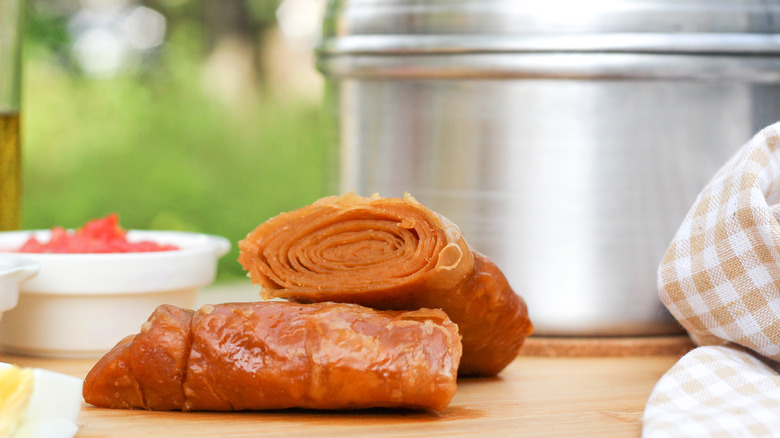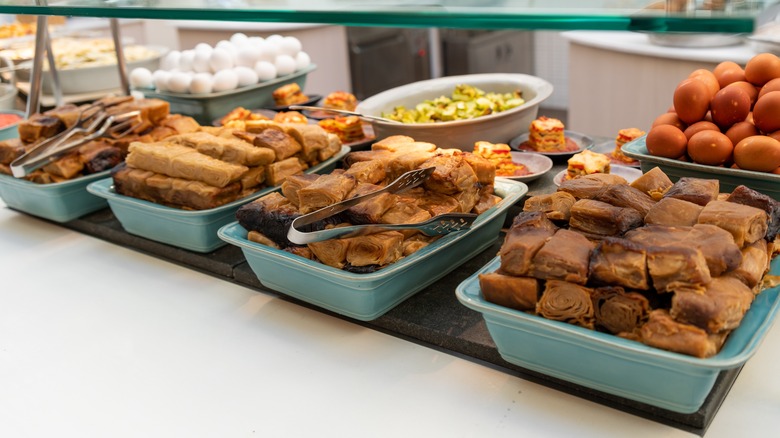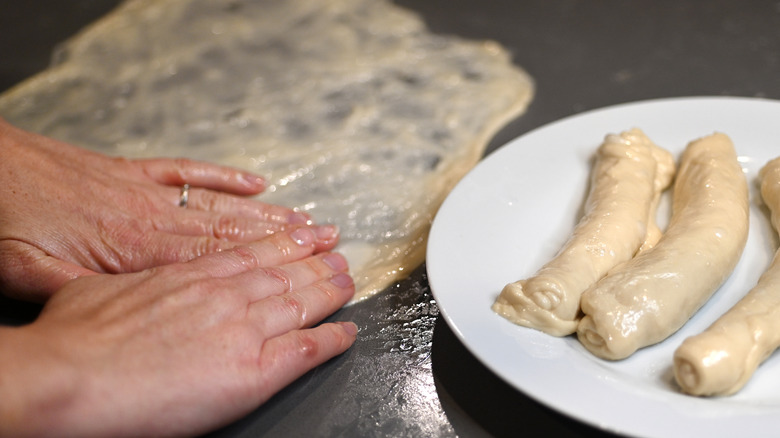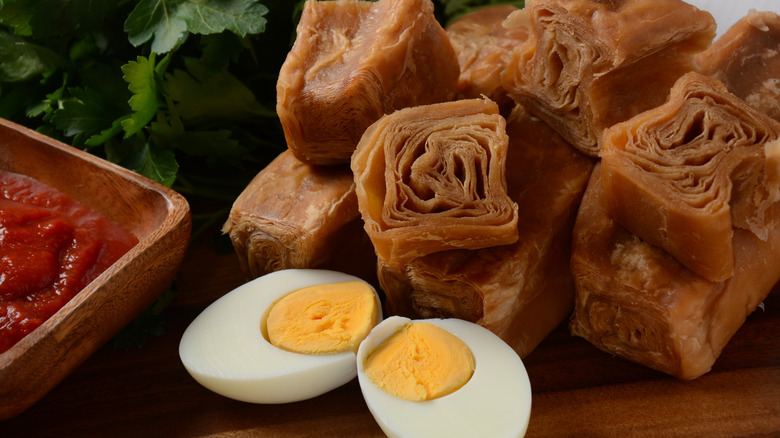The Yemenite-Israeli Pastry That Bakes Overnight
If you thought challah was the ultimate bread-y Jewish Shabbat treat, you may want to think again. Jachnun (most commonly pronounced as "ja-ch-noon") is a hugely popular Saturday morning breakfast food that can be found all across Israel, and for good reason, too (via Jewish Unpacked).
With buttery layers, caramelized edges, and a slightly sweet flavor, there's not much to complain about when it comes to jachnun — aside from its 12-hour bake time. The golden brown bread has the perfect balance of texture, so those who prefer soft and fluffy pastry can pull pieces from the middle sections, and those who desire crunch may prefer the crispier edges, says Hadassah Magazine. And, while this bread does have a long bake time, it is simple to throw together, and its ingredients can be purchased at a low price, making it an attainable rustic treat for anyone who desires it.
Since its inception, this long-adored bread has spread across Israel. From simple roadside stands to ready-to-eat containers in grocery store chains, jachnun can be found just about anywhere in the country.
History of jachnun
Israel was likely first introduced to this crispy bread via the city of Aden in Yemen, a port city in the southern part of the country, per Jewish Unpacked. Historically, jachnun was often prepared and baked on Friday nights in large outdoor ovens called taboons. And, at the time, it was a much more sturdy bread, made up of whole wheat flour and clarified butter, says Forward.
However, the exact origins of jachnun are often debated. According to Forward, the bread could have originated as a variation of the famed Spanish puff pastry, which would have been brought to Yemen by Jews forced out of Spain in the 15th century. Others suggest jachnun could be a spin-off of the Turkish dish, gul. Gul is similar to jachnun, but the Turkish variation is frequently stuffed with meat and potatoes. However, those from the Jewish Yemenite community would have removed the meat to keep kosher (via Jewish Unpacked).
Regardless of its precise origins, according to Tourist Israel, jachnun is a widely popular Yemenite-Jewish food still commonly eaten in Isreal on the Jewish Sabbath.
How to make jachnun
Jachnun's ingredient list comprises simple components that bind together to create a thick, hearty dough. According to Hadassah Magazine's recipe, the dry ingredients in this dish include all-purpose flour, sugar, salt, and baking powder. And, the wet ingredients are typically vegetable oil, water, softened butter, and honey.
While jachnun takes a long time to prepare, it remains relatively uncomplicated to make. Per Emmymade's recipe, the first step in making jachnun is to combine all the ingredients together to form a "shaggy" dough, which is then kneaded and left to rest. Once sufficiently rested, The dough is sectioned into evenly-sized balls and then rolled thin until somewhat translucent. Then, these dough sheets are rolled into cylinders and lined up tightly together in a pot, and buttered. It's then baked overnight at a low temperature until golden. This bread is commonly served with a pairing of fresh grated tomatoes and salt.
How jachnun is made and eaten
One other common ingredient that is traditionally served alongside this bread is eggs. And they're not used for an egg wash or mixed into the dough; rather, whole uncooked eggs are placed around the baking dish and roasted. They emerge looking similar to a hard-boiled egg, and they're undeniably delicious. When the dough is ready to be baked, the eggs are tucked into the sides of the dish on top of the jachnun, and they're baked alongside the bread for the entire 12 hours in the oven, per Jewish Unpacked. When finished, they are removed fully cooked, and they can be enjoyed alongside the bread as a savory pairing.
Saturday mornings in Israel are the most common time to enjoy jachnun. Handmade signs will often appear across the country, where passers-by can stop for their fill of the bread. Some of the most common places to find vendors dolling out jachnun are stands alongside highways and from private homes selling the bread from their kitchens, according to Jewish Unpacked. But if you're looking for a more sophisticated jachnun experience, many Yemenite restaurants serve jachnun on Saturday mornings. Tourist Israel recommends Aviva's Jachnun, among many others, for a Tel Aviv jachnun pit-stop or Jachnun Bar in Jerusalem.
If you didn't already have enough reasons to visit Isreal, then maybe discovering jachnun, and the rest of the thriving food scene, is enough to get you on a plane.



